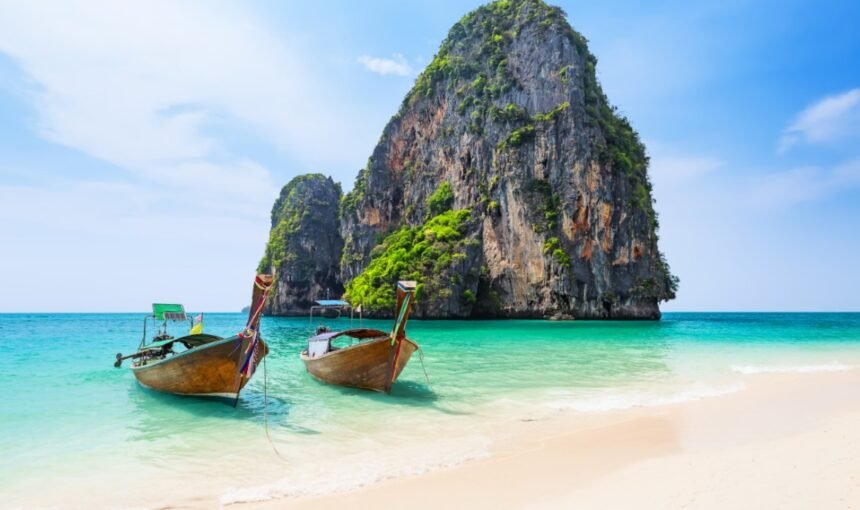If you’re planning a beach trip to Thailand, there’s a new rule you should know about before packing your sunscreen. The Thai government has banned certain types of sunscreens that contain chemicals known to harm coral reefs. Breaking this rule could lead to a fine of up to 100,000 baht (around USD 2,700).
This move is part of Thailand’s ongoing effort to protect its marine parks and preserve the country’s stunning coral reefs. Here’s everything travelers need to know about the new sunscreen law, what products are banned, and what safe alternatives you can use.
Why Thailand Banned Certain Sunscreens
Thailand is home to some of the most beautiful marine parks in the world, from Maya Bay in Krabi to the Similan Islands and Koh Phi Phi. Over the years, the country has seen coral bleaching and reef damage caused by pollution and tourist activity.
Scientists have found that some sunscreen ingredients are toxic to coral. Even small amounts can slow coral growth, damage its DNA, and make it more vulnerable to bleaching. With millions of tourists swimming in Thailand’s waters each year, the buildup of these chemicals has become a serious problem.
To protect its marine life, Thailand decided to take action by banning sunscreens that contain these harmful substances.
Sunscreen Ingredients Banned in Thailand
Travelers are no longer allowed to use sunscreens that contain:
Oxybenzone (Benzophenone-3)
Octinoxate (Ethylhexyl methoxycinnamate)
4-Methylbenzylidene camphor
Butylparaben
These chemicals are often found in popular sunscreen brands, so it’s important to check the label before bringing one into Thailand’s marine parks. Even applying them before entering the water can still affect coral health, as the chemicals wash off your skin.
The Fine for Using Banned Sunscreen in Thailand
Violating the new sunscreen rule can lead to a fine of up to 100,000 baht. The ban applies mainly within Thailand’s national marine parks, which include many popular snorkeling and diving spots.
Park rangers and local authorities have been instructed to watch for violations. You won’t usually be searched at the entrance, but if you’re caught using a banned product or leaving behind empty bottles, you could face a penalty.
The aim isn’t to punish tourists, but to encourage everyone to make more responsible choices that protect the country’s natural treasures.
What Sunscreens Are Safe to Use in Thailand?
The good news is you can still stay safe from the sun without harming the ocean. Look for products labeled reef-safe or mineral-based. These usually contain:
Zinc oxide
Titanium dioxide
These natural minerals create a physical barrier on your skin that reflects UV rays instead of absorbing them, and they don’t damage coral.
Reef-safe sunscreens are easy to find in Thailand, especially in areas like Phuket, Krabi, Koh Samui, and Bangkok. Many local stores and eco-friendly brands already sell approved products.
How Travelers Can Help Protect Thailand’s Coral Reefs
Aside from using reef-safe sunscreen, there are a few simple ways you can make a difference:
Avoid touching coral or standing on reefs while swimming or snorkeling.
Don’t feed fish or disturb marine life.
Use eco-friendly products like biodegradable shampoos and lotions.
Join local beach clean-up activities—many tour companies offer these as part of their programs.
Small actions from travelers add up to big results when it comes to protecting Thailand’s coral reefs for future generations.
Thailand’s new sunscreen ban might seem like a small rule, but it’s a big step toward sustainable tourism. By choosing reef-safe sunscreen and respecting local guidelines, travelers can enjoy the country’s crystal-clear waters while helping preserve them.
Before you head out to Thailand’s beaches, double-check your sunscreen label. A little awareness goes a long way—both for your skin and for the ocean.
Adrenaline junkie with a passion for exploring off-the-beaten-path destinations and finding unique ways to stay active. Expect stunning scenery, challenging workouts, awesome travel tips and a whole lot of fun. Let’s get sweaty and explore the world together!




